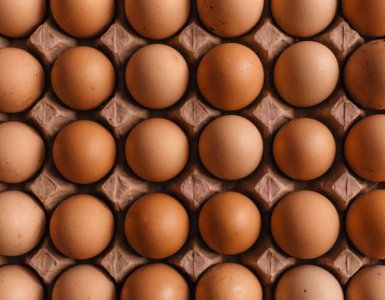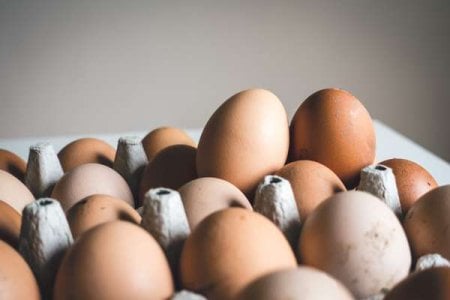Egg prices on the rise? Major changes could impact your grocery budget!
We all love a good egg—whether it be scrambled, fried, or even in a delicious cake. However, it seems we might need to prepare ourselves for a potential price increase in our favourite protein's price. Australian egg farmers have predicted further price rises and even supply issues, and we have the 'eggsclusive' scoop on what this could mean for all of us.

Supermarket giants Woolworths and Coles have already reported difficulties in egg supply over the last 18 months, with the price of a dozen free-range eggs from some brands soaring to a whopping $9. Yes, you read that right, $9 for a dozen eggs!
But why is this happening, and what could it mean for the future of our beloved breakfast staple?
Several reasons have led to this potentially 'eggscruciating' situation - rising feed costs, chicken disease outbreaks overseas, weather issues, and supermarkets phasing out caged eggs sooner than expected.
Darren Latten, Chairperson of the Commercial Egg Farmers of South Australia and Tasmania, pointed out that many families struggling with the high cost of living rely on eggs as an affordable source of protein. He noted, 'You can feed a family for $6, that's pretty cheap.' Unfortunately, with the increasing price of feed, that extra cost is eventually passed on to customers.
Latten explained that over the last two years, the price of wheat has risen from about $400 to $750 per tonne. He described the situation as 'a rollercoaster of an industry.'
Here's a fascinating egg fact: Did you know that Australians consume approximately 230 eggs per person each year, and around 72 per cent of the eggs sold in supermarkets are still caged eggs? It seems we have a long way to go in embracing free-range eggs.
Both Coles and Woolworths have also committed to phasing out caged eggs by 2025, while the government expects the change to be industry-wide by 2036. However, Latten believes that caged egg farmers might not be prepared for this transition, which could further impact supermarket supply.
He suggested that some caged egg farmers might even leave the industry if forced to spend a significant sum of money retrofitting their properties for free-range hens.
With only four caged farmers in South Australia, Latten warned that removing them would create a significant supply gap: 'There's no way there'd be enough eggs to supply the state.'
Albany Farm Fresh Eggs owner Colin Ford agreed, predicting that some caged egg farmers would cease production before the 2036 deadline. He explained that the transition to free-range might not be feasible for these farmers due to various factors, including land availability.
As we potentially head towards a 'cracking' problem with egg prices and supplies, it's essential to make the most of our egg purchases. Try storing your eggs in the main body of the fridge instead of the door to keep them fresher for longer, and experiment with using fewer eggs in recipes to stretch your supplies.
The recent events in the US give us a glimpse of what a severe supply shortage could look like—the price of eggs crashed last month after reaching an incredible $USD18 a dozen earlier in the year. This dramatic price fluctuation was the result of an avian flu outbreak that killed more than 50 million birds in the US.
According to a Coles spokesperson, this outbreak was one of the causes of Australia's supply shortage, with floods in Queensland and Victoria also having an impact on some farmers.

As we move towards a future with only free-range eggs on our supermarket shelves, it's crucial for government authorities and producers to be well-prepared to prevent disease outbreaks and other issues that may impact supply and pricing.
For now, we recommend keeping an eye on egg prices as you shop, and perhaps even exploring alternative sources of protein (like beans, lentils, or tofu) if these changes do end up affecting your grocery budget.
As always, we will keep you updated on this situation, and we hope that your breakfasts continue to be 'eggstraordinarily' delicious!

Eggs have stood the test of time as a beloved and affordable source of nutrition, serving as a crucial dietary staple. Image by erol from Unsplash
Supermarket giants Woolworths and Coles have already reported difficulties in egg supply over the last 18 months, with the price of a dozen free-range eggs from some brands soaring to a whopping $9. Yes, you read that right, $9 for a dozen eggs!
But why is this happening, and what could it mean for the future of our beloved breakfast staple?
Several reasons have led to this potentially 'eggscruciating' situation - rising feed costs, chicken disease outbreaks overseas, weather issues, and supermarkets phasing out caged eggs sooner than expected.
Darren Latten, Chairperson of the Commercial Egg Farmers of South Australia and Tasmania, pointed out that many families struggling with the high cost of living rely on eggs as an affordable source of protein. He noted, 'You can feed a family for $6, that's pretty cheap.' Unfortunately, with the increasing price of feed, that extra cost is eventually passed on to customers.
Latten explained that over the last two years, the price of wheat has risen from about $400 to $750 per tonne. He described the situation as 'a rollercoaster of an industry.'
Here's a fascinating egg fact: Did you know that Australians consume approximately 230 eggs per person each year, and around 72 per cent of the eggs sold in supermarkets are still caged eggs? It seems we have a long way to go in embracing free-range eggs.
Both Coles and Woolworths have also committed to phasing out caged eggs by 2025, while the government expects the change to be industry-wide by 2036. However, Latten believes that caged egg farmers might not be prepared for this transition, which could further impact supermarket supply.
He suggested that some caged egg farmers might even leave the industry if forced to spend a significant sum of money retrofitting their properties for free-range hens.
With only four caged farmers in South Australia, Latten warned that removing them would create a significant supply gap: 'There's no way there'd be enough eggs to supply the state.'
Albany Farm Fresh Eggs owner Colin Ford agreed, predicting that some caged egg farmers would cease production before the 2036 deadline. He explained that the transition to free-range might not be feasible for these farmers due to various factors, including land availability.
As we potentially head towards a 'cracking' problem with egg prices and supplies, it's essential to make the most of our egg purchases. Try storing your eggs in the main body of the fridge instead of the door to keep them fresher for longer, and experiment with using fewer eggs in recipes to stretch your supplies.
The recent events in the US give us a glimpse of what a severe supply shortage could look like—the price of eggs crashed last month after reaching an incredible $USD18 a dozen earlier in the year. This dramatic price fluctuation was the result of an avian flu outbreak that killed more than 50 million birds in the US.
According to a Coles spokesperson, this outbreak was one of the causes of Australia's supply shortage, with floods in Queensland and Victoria also having an impact on some farmers.
Key Takeaways
- Egg farmers predict price rises and supply issues due to factors such as rising feed costs, chicken disease outbreaks overseas, weather issues, and the phasing out of caged eggs.
- Supermarket giants Woolworths and Coles have experienced egg supply shortages over the last 18 months, and the price of a dozen free-range eggs has gone up to $9.
- Both Coles and Woolworths promise to phase out caged eggs by 2025, and the government expects this change to happen industry-wide by 2036, causing caged egg farmers to reconsider their future.
- The price of eggs in the US crashed after reaching $US18 a dozen due to an avian flu outbreak that killed more than 50 million birds.
As we move towards a future with only free-range eggs on our supermarket shelves, it's crucial for government authorities and producers to be well-prepared to prevent disease outbreaks and other issues that may impact supply and pricing.
For now, we recommend keeping an eye on egg prices as you shop, and perhaps even exploring alternative sources of protein (like beans, lentils, or tofu) if these changes do end up affecting your grocery budget.
As always, we will keep you updated on this situation, and we hope that your breakfasts continue to be 'eggstraordinarily' delicious!








